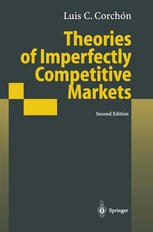

Most ebook files are in PDF format, so you can easily read them using various software such as Foxit Reader or directly on the Google Chrome browser.
Some ebook files are released by publishers in other formats such as .awz, .mobi, .epub, .fb2, etc. You may need to install specific software to read these formats on mobile/PC, such as Calibre.
Please read the tutorial at this link: https://ebookbell.com/faq
We offer FREE conversion to the popular formats you request; however, this may take some time. Therefore, right after payment, please email us, and we will try to provide the service as quickly as possible.
For some exceptional file formats or broken links (if any), please refrain from opening any disputes. Instead, email us first, and we will try to assist within a maximum of 6 hours.
EbookBell Team

4.4
52 reviewsThe ambition of the theory of imperfectly competitive markets is to explain the working of markets in which the issue of strategic interaction among firms is central. Our analysis of this problem will be based on equilibrium concepts borrowed from Game Theory. This research program arises several questions on its feasibility like the empirical relevance of the results, the substantial theoretical insights obtained in this way, etc. Unfortunately, most of these questions can not be answered in the short run. This book is written in the hope that this research strategy is meaningful, but about its final success no body can tell. Another important question is if simpler models could deliver the essential insights offered by the theory of imperfectly competitive mar kets. This Introduction will be devoted to argue that, currently, there is no alternative to the approach presented in this book. Consider the following fact: A square inch of soil in the Explanada of Ali cante (located in front of the sea, right in the middle of downtown) cost several times more than a square inch of soil in San Vicente del Raspeig (located sev eral miles toward the interior of the peninsula). l How can we explain such a thing? First notice that because of the large quantity of possible traders involved in this market, we can safely assume that any agent has to accept the market price, i. e. is a price-taker.